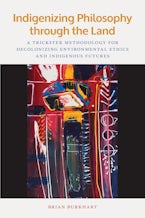Land is key to the operations of coloniality, but the power of the land is also the key anticolonial force that grounds Indigenous liberation. This work is an attempt to articulate the nature of land as a material, conceptual, and ontological foundation for Indigenous ways of knowing, being, and valuing. As a foundation of valuing, land forms the framework for a conceptualization of Indigenous environmental ethics as an anticolonial force for sovereign Indigenous futures. This text is an important contribution in the efforts to Indigenize Western philosophy, particularly in the context of settler colonialism in the United States. It breaks significant ground in articulating Indigenous ways of knowing and valuing to Western philosophy—not as artifact that Western philosophy can incorporate into its canon, but rather as a force of anticolonial Indigenous liberation. Ultimately, Indigenizing Philosophy through the Land shines light on a possible road for epistemically, ontologically, and morally sovereign Indigenous futures.
Preface
Introduction
PART 1. The Coloniality of Western Philosophy and Indigenous Resistance through the Land
Chapter 1. Philosophical Colonizing of People and Land
Chapter 2. Indigenizing Native Studies: Beyond the Delocality of Academic Discourse
Chapter 3. Refragmenting Philosophy through the Land: What Black Elk and Iktomi Can Teach Us about Locality
PART 2. Indigenizing Morality through the Land: Decolonizing Environmental Thought and Indigenous Futures
Interlude
Chapter 4. Everything Is Sacred: Iktomi Lessons in Ethics without Value and Value without Anthropocentrism
Chapter 5. The Metaphysics of Morality in Locality: The Always Already Being in Motion of Kinship
Chapter 6. The Naturalness of Morality in Locality: Relationships, Reciprocity, and Respect
Bibliography
Index

